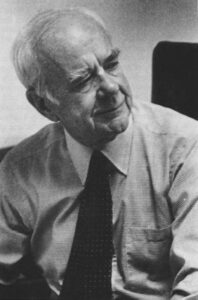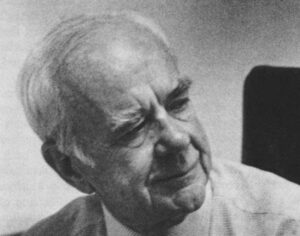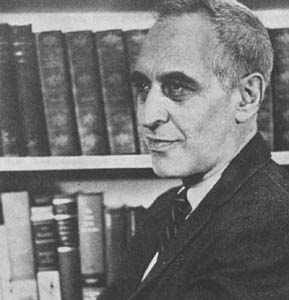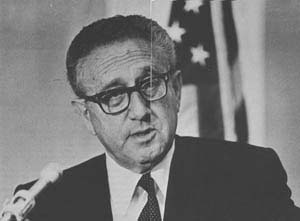American foreign policy has always had its great debates, from the imperialists versus the internationalists. Since the early 1950s, the great debate between the advocates of containment and of liberation: between those who favor containing Soviet communism within its present geopolitical campus and those who favor rolling it back and liberating the people under its sway.
The debate between the advocates of containment and liberation continues to underlie major political differences over arms control, East-West trade, and intervention abroad. The debate has even broken out among conservatives, as evidenced by the Heritage Foundation’s recent symposium, “Beyond Containment,” in which former Reagan administration Arms Control Director Eugene Rostow called on the U.S. to “achieve a balance of power” with the Soviet Union, while former National Security Advisor Richard Allen recommended that the U.S. seek “the dissolution of the Soviet external empire.”
The origins of the containment doctrine, dating from consular official George Kennan’s cable from Moscow in 1947 setting forth the strategy, have been amply researched, but the origins of the liberation doctrine have not been. As a strategy, it became the trademark of a new generation of conservative Republicans, led by Arizona Sen. Barry Goldwater. It was originally developed, however, neither by Republicans nor self-styled conservatives, but by former Communists and Trotskyists like Whittaker Chambers, the former spy who fingered Alger Hiss, and James Burnham, a former CIA consultant. These were men who were still halfway on a journey from left to right and whose view of the Soviet Union was not shaped by debates with State Department officials, but by their anguished reflection on their own revolutionary pasts.

Of these former leftists, the most important was Burnham, a former Trotskyist. In a series of books and articles written from 1946 to 1953, Burnham laid the theoretical basis for the doctrine and strategy of liberation. For the next twenty-five years–until a stroke incapacitated him–he served as the principal senior editor and foreign policy columnist for William Buckley’s National Review. Historian George Nash, in his authoritative study, The Conservative Intellectual Movement in America, wrote, “More than any other single person, Burnham supplied the conservative intellectual movement with the theoretical formulation for victory in the cold war.”
Burnham was a product of the internecine battles among left-wing New York intellectuals during the 1930s. Born in Chicago in 1905, the son of a railroad executive, Burnham was educated at Princeton and Oxford and became in 1930 a member of the New York University Philosophy Department. His colleague William Barrett said of him that he “bore the stamp of the gentleman in his bearing–so much so that in comparison with some of the more raucous types of the New York intellectual he appeared almost shy and diffident.” But Burnham’s calm and urbane exterior concealed a passion for ideological politics.
In 1934, Burnham joined the Workers’ Party–later called the Socialist Workers’ Party–and became an editor of their journal, The New International. The Workers’ Party was an outgrowth of Soviet exile Leon Trotsky’s attempt to establish a Fourth International to promote world communist revolution. Burnham had come to share Trotsky’s conviction that the Soviet Union was not socialist, but a “degenerated workers’ state” that was “transitional from capitalism to socialism.” He also agreed with Trotsky that Stalin had “betrayed” Lenin and the 1917 revolution by subordinating the need for international revolution to narrow national and immediate interests. “The ‘theory’ of socialism in one country,” Trotsky had written, “signaled an effort to liberate Soviet foreign policy from the program of international revolution.”
Burnham broke with Trotsky and the Socialist Workers Party in 1940 after the Soviet Union invaded Finland and signed a non-aggression pact with Nazi Germany. When Trotsky contended that the party should continue to defend the Soviet Union internationally even while criticizing Stalin’s reign (“the defense of the USSR coincides for us with the preparation of world revolution”), Burnham responded, in a sharp exchange, “No Comrade Trotsky, we will not fight alongside the GPU [the Soviet Secret Police] for the salvation of the counter-revolution in the Kremlin.” Like many factional debates, this one quickly expanded to the nature of the Soviet Union and the validity of Marxism itself.
After leaving the Trotskyist movement, Burnham spent the next thirteen years grappling with its legacy, on the one hand, and with World War II and the emergence of the Soviet Union as a world power, on the other hand. His thinking went through two distinct stages. In The Managerial Revolution and The Machiavellians, published in 1941 and 1943, respectively, Burnham, under the influence of another former Trotskyist Braun Rizzi, described the Soviet Union as being neither capitalist nor socialist, but as evolving toward a new form of managerial society, characterized by state bureaucratic rather than individual capitalist control of the economy. In this regard, Burnham argued, there was “no formal identity but a historical bond uniting Stalinism (communism), Nazism (fascism), and New Dealism.” Burnham saw the world divided between managerial and capitalist states; and from the ashes of World War II, he predicted, the U.S., Germany, and Japan, the three strongest managerial states, would emerge triumphant.
In The Machiavellians, Burnham’s most brilliant book, he derived from Machiavelli and the attenuated Marxism of Italian political sociology the methodology that underlay his analysis of The Managerial Revolution. Societies were governed by “myths,” Burnham argued, whose “formal meaning” disguised the “struggle for power” that was their “real meaning.” Thus, Stalin’s “socialism” was a myth intended to disguise the real meaning of his politics. “The word ‘socialism’ is used for ideological purpose in order to manipulate the favorable mass emotions attached to the historic socialist ideal of a free classless and international society and to hide the fact that managerial society is in actuality the basis for a new kind of exploiting class society,” Burnham wrote. Of Soviet foreign policy, Burnham wrote, “The pseudo-internationalism…is simply the extension of Russian nationalism on the world arena.”
The Soviet defeat of Nazi Germany destroyed Burnham’s historical hypothesis in The Managerial Revolution and forced him to revise his view of world history and the Soviet Union. In 1946, in an essay entitled “Lenin’s Heir,” Burnham abandoned the last vestiges of Trotsky’s analysis of the Soviet Union. Burnham now insisted that Stalin and not Trotsky was Lenin’s political heir. “Under Stalin, the communist revolution has been, not betrayed, but fulfilled,” Burnham wrote.
Burnham’s new estimation of Stalin and Soviet communism was based on a line of argument merely implicit in The Machiavellians. Burnham distinguished Machiavelli from his predecessors by the fact that he founded his politics on a “scientific” rather than a “utopian” basis. Even though Machiavelli was a republican, he had laid aside his preferences when he realized that only a prince could achieve his most important goal, the unification of Italy. For Burnham, the real meaning of this distinction must have lay in its application to his own socialist past. If the analysis of The Managerial Revolution were correct, then socialism, as Trotsky and Burnham had understood it, was a utopian fantasy rather than an eventually realizable goal by which to evaluate the shortcomings of the present. The Soviet victory in World War II appeared to confirm rather than invalidate this line of argument. In “Lenin’s Heir,” Burnham continued to maintain that Soviet socialism was a myth that promised freedom and abundance but led to “slavery and terror and suffering.” He now contended, however, that slavery, terror, and suffering were the real meaning of socialism rather than indicative of a different form of society. The Marxist ideal of socialism had become an irrelevant fantasy; for Burnham, Stalinism had become the formal and real meaning of socialism. “Stalinism is communism,” Burnham concluded.
In “Lenin’s Heir,” Burnham also rejected Trotsky’s view that Stalin had abandoned the goal of international communism. The reasoning was similar. Burnham insisted that the Soviet goal remained a world communist order, but that its real meaning would be a world ruthlessly dominated by Soviet power. Under Stalin, Burnham wrote, Soviet communism had become a “conspiratorial movement for the conquest of a monopoly of power in the era of capitalist disintegration.”
Burnham’s analysis now rested on a double standard. On one hand, he still contended that communist doctrine was merely myth, but on the other hand he freely quoted from Marx, Lenin, and Stalin in trying to demonstrate that the Soviet goal was not merely national security or imperial enhancement, but world revolution. Burnham had abandoned Trotskyism and his own highly original analysis. Like the disillusioned Communists with whom he would later collaborate, he had adopted a kind of inverted Stalinism that borrowed from Stalin’s own explanations of his actions but put a negative rather than a positive sign in front of them.
Burnham’s strategy for liberation was based on his altered view of the Soviet Union. In The Struggle for the World, published in 1947, Burnham warned that as World War II was drawing to a close, World War III–pitting the Soviet Union against the United States and Great Britain–had begun. With the invention of nuclear weapons, the new war threatened to annihilate both sides. The only alternative, Burnham argued, was for either the U.S. or the Soviet Union to establish a “universal empire” based on its monopoly of nuclear weapons.
Burnham’s concept of universal empire was borrowed from historian Arnold Toynbee, but it also mirrored what Burnham believed to be Stalin’s strategy for world domination. Burnham argued that in order to survive the Soviet threat, the U.S. would have to create a system of hegemonic alliances and colonial and neocolonial relationships that would isolate the Soviet Union. The U.S. would also have to be “willing to fight.” To maintain its nuclear monopoly, Burnham seemed to imply, the U.S. might have to undertake a preventive nuclear strike.
The Struggle for the World contained the seeds of Burnham’s disagreement with the Truman administration’s containment strategy. Burnham insisted that the U.S. undertake an “offensive” rather than “defensive” strategy; and he rejected the view that Kennan would popularize that the Soviet Union, shaped by its Czarist as well as its Leninist past, would eventually moderate in the face of determined opposition from the American camp. Burnham became, if anything, more rigid and apocalyptic in his identification of the Stalinist present, including its reign of unbridled terror, with Soviet socialism’s essential nature and future.
In Containment or Liberation, published in 1953, Burnham made his differences with Kennan and the Democrats explicit. While Kennan (in Burnham’s words) understood the Soviet Union as an “extension of Czarist imperialism,” Burnham insisted that it was “an entirely new revolutionary power.” From Kennan’s view, Burnham argued, a balance of power strategy–containment–followed. But the Soviet Union could not be contained like the typical “post-Renaissance nation-state:”
It is hard to see what it means to try to ‘contain’ a universalistic, militant, secular religion, based on a vast land mass inhabited by 800 million humans, which has irrevocably set itself the objective of monolithic world domination and which already exists and acts inside every nation in the world.
Burnham warned that if the containment strategy were followed, the U.S. was doomed. “If the Communists succeed in consolidating what they have already conquered,” Burnham wrote, “then their complete world victory is certain.”
In The Struggle for the World, Burnham’s strategy appeared to mirror that of Stalin’s, but in Containment or Liberation Burnham recommended a policy that in its openness recalled that of the Trotskyist Fourth International. Arguing that Eastern Europe was the weak link in the communist chain, Burnham called upon the U.S. to undertake an “open policy of liberation toward the USSR and its satellites and captive nations.” This would include setting up a kind of counter-revolutionary international from exile governments, to which the U.S. would transfer recognition. Its explicit goal was not membership in the American empire, but in a new Eastern European federation.
Burnham insisted that the U.S. would have to prepare itself for war. He warned prophetically against encouraging “premature narrow uprisings,” but then added:
What if in a captive nation a broad mass uprising against the regime began? Or what if one of the communist governments, supported by the majority of the people, decided against Moscow? And, in either case, what if help were then asked from the free world?…Would not passivity under such circumstances be a final proof of the irreversibility of communist world victory?
When Burnham was developing his strategy for liberation, he thought of himself as being neither on the left nor the right, but he remained close to the anti-Communist liberals on Partisan Review and in the American Congress for Cultural Freedom. Having resigned from NYU, he worked as a consultant to the newly formed Central Intelligence Agency, an institution identified with liberal anti-Communism. Burnham’s The Struggle for the World was as firmly denounced on the isolationist right as it was on the pro-Soviet left. Felix Morley, an editor of Human Events, charged Burnham with using “the very real threat of Soviet Russia…to advocate the dissolution of the American republic” and “the establishment of an American empire in its place.” But in the early ’50s, Burnham parted ways with the liberal anti-Communists over McCarthy; and he left the CIA–according to Howard Hunt, who knew him in the agency, he was “blacklisted” by the CIA. And he found a political home with a new generation of conservative Republicans who were internationalist rather than isolationist–Goldwater was an Eisenhower rather than Taft backer at the 1952 Republican convention–but who were dissatisfied with the Democrats’ containment strategy. These new conservatives adopted Burnham, Chambers, Frank Meyer, Willi Schlamm and other former leftists; and in turn the former leftists provided them with a seemingly credible view of the Soviet Union and with a strategy by which they could imagine defeating it.
But were Burnham, Chambers and Meyer’s view and strategy not merely credible but valid–or to use Burnham’s own term, were they scientific? During the ’50s alone, Burnham’s inverted Stalinist view of the Soviet Union faced two tests from which it did not emerge unscathed: Soviet Premier Nikita Krushchev’s February 1956 denunciation of Stalin and the subsequent thaw, on which the Soviet Union has never entirely reneged (discredited party officials are forced into retirement or sent to manage distant power stations rather than being shot); and the Sino-Soviet split, which, beginning in 1958, destroyed Burnham’s view of a communist monolith. Burnham’s liberation strategy faced an even sterner test: in 1956, when Soviet troops invaded Hungary and the government pleaded for help, Western governments found that, short of risking nuclear war, they stood powerless.
Burnham himself was a passionate systematizer, but by no means a dogmatic one. In 1956, he offended his colleagues on National Review by acknowledging the thaw and by admitting the political impossibility of aiding the Hungarians. In effect, Burnham admitted that the liberation strategy–as an “offensive” measure undertaken by the U.S.–was a “utopian” rather than “scientific” doctrine. But other conservatives fitted Krushchev’s speech to their preconceptions (Meyer and Schlamm argued that it masked even more extreme Stalinization) and denounced the Eisenhower administration’s passivity in Hungary without recognizing its ultimate causes.
Burnham’s legacy does not comprise his subsequent qualifications and hesitations, but rather the zealous certainty with which, from 1946 through 1953, he described and made plans for dealing with the Soviet menace. As is certainly the case with Marx, those who appreciate Burnham–including the highly creative years of The Managerial Revolution and The Machiavellians–will one day have to disentangle him from his followers.
©1985 John B. Judis
John B. Judis, senior editor on leave from In These Times, is exploring the development of American conservative politics.




